 Going into Gmail today we noticed “Google Mail in the UK” highlighted in red on the top line. Ever curious, clicking it revealed that from today, 19 October 2005, all new accounts created in the UK will use the domain googlemail.com, not the previous Gmail.com.
Going into Gmail today we noticed “Google Mail in the UK” highlighted in red on the top line. Ever curious, clicking it revealed that from today, 19 October 2005, all new accounts created in the UK will use the domain googlemail.com, not the previous Gmail.com.
Sensing a story, we dived onto Google news to find a number of publications had got there first. Figuring if you can’t be first, be thorough, we present the following.
The details below come from extended digging and a long conversation with Shane Smith, CEO of Independent International Investment Research (IIIR), the company in dispute with Google over Gmail. At the end of the piece is a copy of the press release from Google.
There has been a long running trademark dispute in the UK between Google and an UK AIM-listed company, Independent International Investment Research (IIIR), who claim trade mark confusion with their G-mail service.
Given it has been such a long running dispute and anything that Google is close to is so news worthy, it’s not clear why it’s taken so long for this to get on to the news radar.
Google’s free email service, Gmail, started in April, 2004. IIIR’s Mr Smith told us that on that day he’d sent a letter to Larry and Serge at Google pointing out that IIIR already had a service called G-mail, and suggested that at this early stage, they could quickly change its name to GoogleMail to avoid confusion. There was no reply from Google central.
 IIIR’s G-mail is an email service that is part of their offering to their clients, enabling them to send IIIR’s research to their clients clients (if you follow). G-mail is an abbreviation of the full name – Graffiti-mail.
IIIR’s G-mail is an email service that is part of their offering to their clients, enabling them to send IIIR’s research to their clients clients (if you follow). G-mail is an abbreviation of the full name – Graffiti-mail.
Speaking to Smith we learnt that IIIR felt that they had common law in certain jurisdictions, but in their words, “to ensure protection”, applied for trade mark protection in the EU block and the US. Surprisingly this was not something that Google had done already.
Discussions with Google did start, at this point on a friendly level. Smith told us that Google requested that IIIR get an independent valuation carried out for a basis for their discussions, which they duly did.
Back in December 2004, IIIR received a valuation report from Valuation Consulting Ltd putting the value of the trademark at between £25m-£34m.
The document is an interesting read with the crux of it being …
“that a large amount has been written about the free email based service using the Mark and that to re-establish the brand presence would be very costly for Google, we are confident that conservative assumptions should yield a solid valuation as follows.
We have used a very conservative royalty rate of 0.5%, applied to Google’s annualized revenues of $3,224million to give revenues of around $16million attributable to advertising promoted by use of the Mark. Using a very conservative multiple range of 3 to 4 to capitalize this amount gives a range of values of, say, $48million to $64million or, using an exchange rate of 1.9:1 £25million to £34million.”
Smith told us that following this Google rejected the reports findings and counter-offered an amount “seemingly picked out of thin air”, that “couldn’t be justified”.
To add to the complexity of this tale, there’s a separate dispute in Germany over the Gmail name, by a company separate to IIIR (as mis-reported in many publications). Back in September, this other company had their injunction against Google upheld (PDF).
Reading through past press releases of IIIR it’s clear that one of their concerns has been having sufficient funds to pursue Google, whose pockets are significantly deeper. In their September release we not that IIIR points out that “the Board (IIR’s) notes that it has received three expressions of interest in providing finance for costs of litigation and these approaches will be explored further.”
 Given Google’s world-shattering valuation, it’s hardly surprising (if not a little disheartening) to hear that there are people queuing up to find a dispute with Google.
Given Google’s world-shattering valuation, it’s hardly surprising (if not a little disheartening) to hear that there are people queuing up to find a dispute with Google.
__We wonder …
We’ve been wondering for a while at Digital-Lifestyles towers, why we’ve been seeing news stories to the right of email in Gmail, rather than the pure commercials that were previously being shown. Given IIIR’s estimated values are based on a percentage of Google advertising revenue, we wonder this has lead to the new mixture of news stories and advertising.
There was a buzz around the office when we wondered if the use of the new googlemail.com domain is a chance to get a better/more personal username on the service. A dash to the browser and some frantic keying later revealed nothing of the sort. It appears that the both gmail and googlemail accounts are drawn from the same pool.
Another thing we learnt reading through the papers prepared for IIIR is that Google didn’t invent the technology behind AdSense themselves, they bought a company back in April 2003, Applied Semantics, who provided it. This was news to us.
__Summary
When I asked what Smith thought of Google’s Don’t be evil mantra, he suggested they might add that “to be pretty nasty is OK.”
We’ve got no idea who is right and who is wrong here, we’re just reporting what we’ve been told. We leave the legal wrangling to overpaid lawyers.
It’s clear that many Gmail users are pretty unhappy today, Smith said he’d received a large number of mail from Gmail users asking why he was ‘bullying’ Google.
————————–
Google’s Press statement – On record
From today, Google is changing the name of its web-based email service, Gmail, to Google Mail in the UK.
Another company has claimed the rights to Gmail but their applications are still pending and they have not provided sufficient evidence to establish common law rights based on use in the large number of countries it claimed use. In spite of the tenuous nature of their claims, we still tried to resolve this matter through negotiations.
This company has been very focused on a monetary settlement. We went back and forth trying to settle on reasonable terms, but the sums of money this company is demanding are exorbitant.
We are still working with the courts and trademark office to ensure our ability to use the Gmail name, but this could take years to resolve, and in the meantime, we want our users to have an email address and experience they can rely on.
We also want to relieve both Google and our users of the distraction of the dispute, so that Google can focus on providing a great product, and our users can enjoy a consistent, positive email experience.
So, we are voluntarily making the switch from Gmail to Google Mail and have now begun to issue new users ‘@googlemail.com’ addresses.
Starting October 19, 2005, all new accounts will have @googlemail.com addresses. We believe this is the most simple solution rather than having what could be years of distracting negotiations and disputes for the company and uncertainty about the name for our users.
We want to reassure our users that the service itself it not changing: all messages are being sent and delivered as before
On background
- Google first offered the Gmail service on April 1st, 2004. Immediately after we offered this new product – which made front page news worldwide – the CEO of a company called Independent International Investment Research (IIIR) filed a trademark application in the US for the name ‘Gmail’.
- IIIR’s G-mail (note that IIIR uses the mark with a hyphen but filed for Gmail without a hyphen) is a feature in IIIR’s Pronet financial analytics software that a Pronet user can click on to send a report to someone else who also has Pronet software.
- It appeared that our product and their feature seemed to have two different audiences and uses, and were fairly distinct from one another. (We do not believe their product is a web based email service; to say that it is would be like saying Picasa is an email service because it allows you to email photos.)
- Shane Smith, IIIR’s chairman and chief executive, contacted us in June 2004 and claimed rights to ‘Gmail’ and sought a “business solution”; in other words, they wanted money.
- In usual circumstances, when a trademark owner who cares about and wants to protect the rights of their mark approaches the user of the mark with a claim, they take a fairly standard number of actions: they seek to prevent further use (often through a cease and desist or an injunction) and determine ways to reduce consumer confusion.
- IIIR did not take any of these standard courses – they did not ask us to stop using the name until almost a year after first contacting us and never went to court to ask for an injunction – they just asked us for money.
- Gmail is obviously a name we care about and millions of users around the world are now familiar with, so we of course began negotiations—starting with asking for details of their product and instances of their usage of the name.
- While we only received more letters and a few company brochures, we really wanted our users to keep the name Gmail and thus we went back and forth trying to settle on reasonable terms. IIIR rejected our offers.
- Bear in mind that IIIR’s claim to rights in the Gmail mark is tenuous at best. They do not have a trademark registration (they have a pending application). They do not use Gmail, they use G-mail (with a hyphen). They don’t use G-mail for an email service.
- During our negotiations, we asked for evidence to support their assertion that they had common law rights in 80 countries, and evidence of their actual user base. To date, they have still not sent us that information. But they have continued to ask for money.
- Last June, more than a year after Gmail was launched and over which time the product had become well liked by users, IIIR finally asked us to stop using the name.
- They asserted that our use of “Gmail” was not respecting their intellectual property rights and was tainting the integrity of their business.
- At the same time, Mr. Smith decided to go to the UK media with his story, despite having asked us to keep our discussions confidential. When we tried to respond to media inquiries, IIIR became incensed and provided more alleged ‘information’ about our confidential email discussions.
- Trying to work things out has become distracting, and annoying. We feel like we are being taken advantage of.
- We believe that we have a good case for the trademark rights, and would be willing to leave it up to the courts to decide. Unfortunately, this process can take years.
- We do not want new users to constantly wonder whether they’ll need to change their email address. We do not want users caught in the middle of what has become a very public debate. We do not want to be continually distracted by this while we’re trying to build a better email service.
- So starting October 19, 2005, everyone in the UK will see Gmail as Google Mail. All new email accounts we issue will be @googlemail.com accounts.
- This change seemed a good way to resolve this to the benefit of our users.
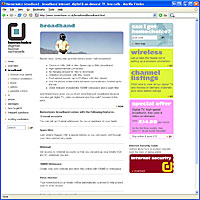 The wires are hot with rumours that BSkyB is contemplating a bout of wad waving in the direction of the video-on-demand, broadband and telephone company Homechoice, which is reportedly finding things tres tricky in the increasingly competitive TV broadband market.
The wires are hot with rumours that BSkyB is contemplating a bout of wad waving in the direction of the video-on-demand, broadband and telephone company Homechoice, which is reportedly finding things tres tricky in the increasingly competitive TV broadband market. Homechoice currently provides a broadband Internet and telephone service, with on-demand programmes covering comedy, drama, music soaps, pay-per-view movies and home shopping.
Homechoice currently provides a broadband Internet and telephone service, with on-demand programmes covering comedy, drama, music soaps, pay-per-view movies and home shopping. City analysts, however, suspect that Sky could snap up the company as part of its plans for video-on-demand and broadband.
City analysts, however, suspect that Sky could snap up the company as part of its plans for video-on-demand and broadband.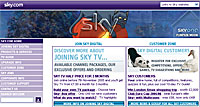 Vodafone UK and British Sky Broadcasting (Sky) have announced an agreement to launch Sky Mobile TV, the UK’s first commercially available mobile TV service available on a wide range of handsets, as we
Vodafone UK and British Sky Broadcasting (Sky) have announced an agreement to launch Sky Mobile TV, the UK’s first commercially available mobile TV service available on a wide range of handsets, as we  The deal looks set to turbo-boost adoption of entertainment and information services to mobile phones, with users able to enjoy TV programmes on the move with access to live breaking news and sports reports from Sky News and Sky Sports News.
The deal looks set to turbo-boost adoption of entertainment and information services to mobile phones, with users able to enjoy TV programmes on the move with access to live breaking news and sports reports from Sky News and Sky Sports News.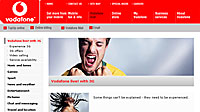 The Sky Mobile TV pack will be provided free of charge (subject to Vodafone customer fair usage policy) until the end of January 2006, with customers being charged £5.00 (~$8.90, €7.38) per month for each of the Sky Mobile TV packs subscribed to thereafter,
The Sky Mobile TV pack will be provided free of charge (subject to Vodafone customer fair usage policy) until the end of January 2006, with customers being charged £5.00 (~$8.90, €7.38) per month for each of the Sky Mobile TV packs subscribed to thereafter, Additional mobile channels are likely to sign up to the Sky Mobile TV service over the coming months.
Additional mobile channels are likely to sign up to the Sky Mobile TV service over the coming months.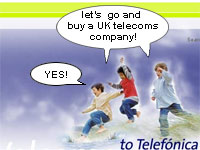 Telefonica SA, Spain’s número uno telecoms company, has agreed to shell out a massive £17.7 billion ($31.5 bn, €21.15bn) for U.K. mobile-phone operator O2, making it the largest acquisition in the European telecommunications industry for half a decade.
Telefonica SA, Spain’s número uno telecoms company, has agreed to shell out a massive £17.7 billion ($31.5 bn, €21.15bn) for U.K. mobile-phone operator O2, making it the largest acquisition in the European telecommunications industry for half a decade. Management execs at the two European telecommunications operators were positively purring at news of the deal.
Management execs at the two European telecommunications operators were positively purring at news of the deal.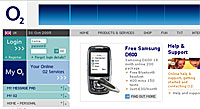 O2 was spun off from the BT Group in November 2001 and currently employs 5,000 people.
O2 was spun off from the BT Group in November 2001 and currently employs 5,000 people. Nestled down low in the small print of an advert for some HP servers which run unix/Windows and Linux, the following text can be found
Nestled down low in the small print of an advert for some HP servers which run unix/Windows and Linux, the following text can be found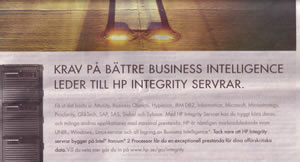 Quite who originally spotted this blunder in the small print, isn’t known, but we suspect that it’s someone with a very keen eye for detail – verging on the fanatical.
Quite who originally spotted this blunder in the small print, isn’t known, but we suspect that it’s someone with a very keen eye for detail – verging on the fanatical. A Hong Kong doleboy has been slapped down by The Man after he was found guilty of distributing three Hollywood films using BitTorrent’s peer-to-peer file sharing technology.
A Hong Kong doleboy has been slapped down by The Man after he was found guilty of distributing three Hollywood films using BitTorrent’s peer-to-peer file sharing technology. The OpenSource BitTorrent software has become one of the most popular means of downloading large files, with the technology allowing users to download fragments of a large file from multiple users, rather than in one hefty lump.
The OpenSource BitTorrent software has become one of the most popular means of downloading large files, with the technology allowing users to download fragments of a large file from multiple users, rather than in one hefty lump. More details about Jason Tomczak’s class action against Apple for releasing defective iPod Nanos have emerged on The Inquirer’s site.
More details about Jason Tomczak’s class action against Apple for releasing defective iPod Nanos have emerged on The Inquirer’s site.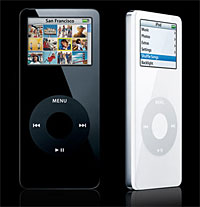 The plaintiff alleges that with Steve Jobs whipping the Nano out of his pocket in a TV advert, Apple led consumers to believe the machine was durable.
The plaintiff alleges that with Steve Jobs whipping the Nano out of his pocket in a TV advert, Apple led consumers to believe the machine was durable. Ironically, things haven’t been helped by the iPod nano appearing on the scene straight after the phone’s launch, with the ultra-small pocket rocket holding 10 times the amount of songs for half the price
Ironically, things haven’t been helped by the iPod nano appearing on the scene straight after the phone’s launch, with the ultra-small pocket rocket holding 10 times the amount of songs for half the price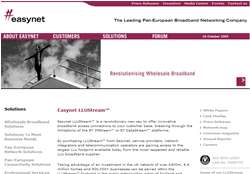 As we reported last week, Easynet has been bought by Sky – as long as they get shareholder approval, but since Sky have offered a premium on Easynet’s shares, this should be a done deal.
As we reported last week, Easynet has been bought by Sky – as long as they get shareholder approval, but since Sky have offered a premium on Easynet’s shares, this should be a done deal. Even though Sky are buying into LLU, Easynet only cover around 250 exchanges and currently all the voice goes to BT (Easynet use the shared metallic path LLU option), while Sky are likely to want to take the phone service as well (they already have a SkyTalk package using CPS provided by THUS). Sky will need to invest to make this a reality as well as increasing Easynet’s coverage. They have said they want to go into around 1000 exchanges, so that’s a build out of around 750 – which won’t be cheap (probably another £100m’ish at least).
Even though Sky are buying into LLU, Easynet only cover around 250 exchanges and currently all the voice goes to BT (Easynet use the shared metallic path LLU option), while Sky are likely to want to take the phone service as well (they already have a SkyTalk package using CPS provided by THUS). Sky will need to invest to make this a reality as well as increasing Easynet’s coverage. They have said they want to go into around 1000 exchanges, so that’s a build out of around 750 – which won’t be cheap (probably another £100m’ish at least). If all the LLU players aggregated infrastructure and competed on services, they could build a 21CN of their own now. LLU competition is going to be fiercely competitive with Wanadoo, AOL, Sky and even Be offering a triple-play – all competing for the same customers. – as well as BT (who will have nationwide coverage) and not ignoring NTL/Telewest who are also going into LLU.
If all the LLU players aggregated infrastructure and competed on services, they could build a 21CN of their own now. LLU competition is going to be fiercely competitive with Wanadoo, AOL, Sky and even Be offering a triple-play – all competing for the same customers. – as well as BT (who will have nationwide coverage) and not ignoring NTL/Telewest who are also going into LLU. We were sitting around, thinking we were all very clever coming up with the products that we thought readers of Digital-Lifestyles would like to see around xmas time, when one of the throng (Mike), came up with a great idea. Why don’t we ask the readers, rather than second guess them.
We were sitting around, thinking we were all very clever coming up with the products that we thought readers of Digital-Lifestyles would like to see around xmas time, when one of the throng (Mike), came up with a great idea. Why don’t we ask the readers, rather than second guess them. Mobile phone heavyweights Motorola, have reported bumper earnings for the third quarter, with profits more than tripling after record sales.
Mobile phone heavyweights Motorola, have reported bumper earnings for the third quarter, with profits more than tripling after record sales.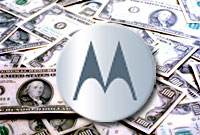 Handsets were up 41% year-on-year with quarterly sales soaring 26% to a new high of $9.42bn, from $7.5bn for the same period in 2004.
Handsets were up 41% year-on-year with quarterly sales soaring 26% to a new high of $9.42bn, from $7.5bn for the same period in 2004.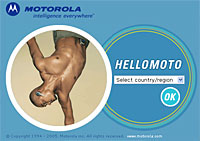 “We are very excited about our third quarter results and overall performance year-to-date… Excluding re-organisation charges, all four of Motorola’s businesses grew profitably during the quarter,” said a deeply chuffed Zander.
“We are very excited about our third quarter results and overall performance year-to-date… Excluding re-organisation charges, all four of Motorola’s businesses grew profitably during the quarter,” said a deeply chuffed Zander. Going into Gmail today we noticed “Google Mail in the UK” highlighted in red on the top line. Ever curious, clicking it revealed that from today, 19 October 2005, all new accounts created in the UK will use the domain googlemail.com, not the previous Gmail.com.
Going into Gmail today we noticed “Google Mail in the UK” highlighted in red on the top line. Ever curious, clicking it revealed that from today, 19 October 2005, all new accounts created in the UK will use the domain googlemail.com, not the previous Gmail.com.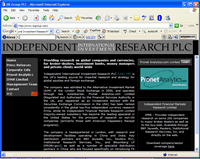 IIIR’s G-mail is an email service that is part of their offering to their clients, enabling them to send IIIR’s research to their clients clients (if you follow). G-mail is an abbreviation of the full name – Graffiti-mail.
IIIR’s G-mail is an email service that is part of their offering to their clients, enabling them to send IIIR’s research to their clients clients (if you follow). G-mail is an abbreviation of the full name – Graffiti-mail.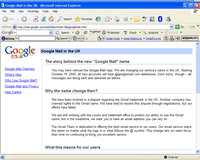 Given Google’s world-shattering valuation, it’s hardly surprising (if not a little disheartening) to hear that there are people queuing up to find a dispute with Google.
Given Google’s world-shattering valuation, it’s hardly surprising (if not a little disheartening) to hear that there are people queuing up to find a dispute with Google.